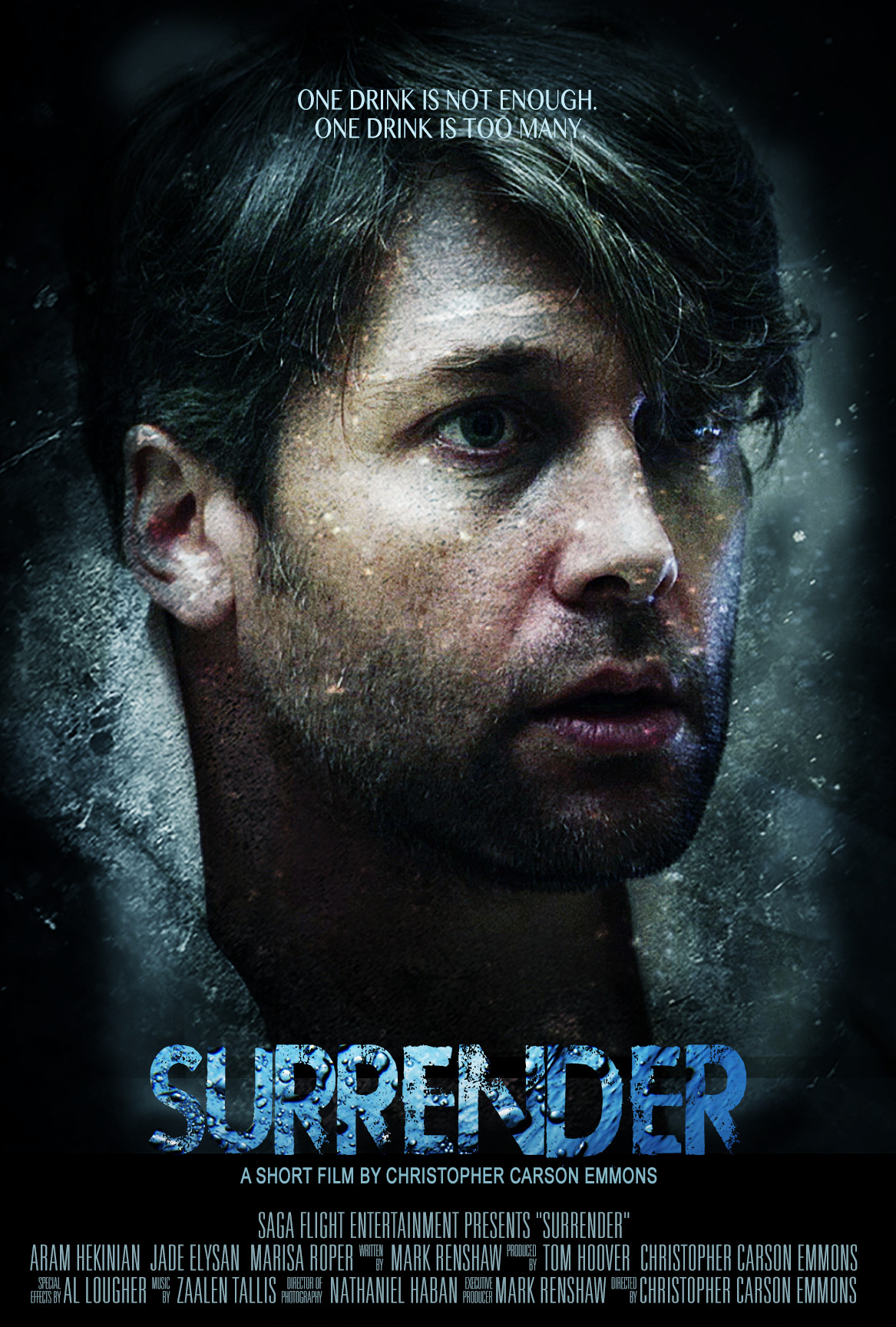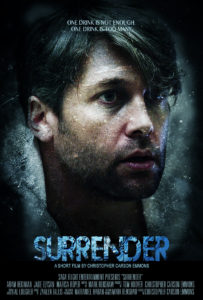
Short Film Review “Surrender”
WATCH THE FILM HERE
First, the Recap:
Dependency. Habit. Problem. Addiction. With the pressures of daily life to contend with, some heavier than others, it becomes an all too easy “fix” to seek release in things or actions that can harm us physically, damage us mentally, or do both. In such a state of affairs, when does one reach breaking point? The daily life of Dave (Aram Hekinian) is a constant waking nightmare, even as his hangover-fueled consciousness slowly introduces yet another bout of alcohol-induced haze. For every step he takes, everything around him turns to dark shades, reminders of what his current choices have wrought, or could still bring to bear. All to quickly, inner demons start to manifest from somber dream to reality.
Step by step, Dave sees his existence being stripped away. Commencing with an already stilted view of himself, Dave witnesses his own “ghosts” while always feeling the need to take another drink to ease the restlessness and pain. The isolation from his wife Julie (Jade Elysan) and daughter Kimberly(Alyssa Maria App) followed by the temptations of another woman (Marisa Roper) at his office, all hound him relentlessly. Yet, he is unable to cease his actions, spiraling farther and farther down a rabbit hole of his own making, the dark demons only there to further his consumptions and cause an even deeper melancholy and hopelessness. Yet, at its height, Dave suddenly awakes to those that offer to help him, and a realization finally hits home–he’s not alone.
Next, my Mind:
When addressing an issue that is extremely evocative and meant to paint the most formidable and influentially dominant picture of it for a viewing audience, look no further than director/co-producer Christopher Carson Emmons and writer/co-producer Mark Renshaw’s compellingly haunting and deftly persuasive 15-minute short film on the nature of alcoholism and its ramifications. Pulling no punches, it is brute force, in-your-face truths surreally envisioned from the perspective of a man seriously burdened by the weight of sustained, virtually unabating intoxication to the point of completely losing touch with reality, which has since been replaced by the harrowing and totally nightmarish incarnations of the demons that plague him. Yet, even with this seemingly endless despondent state, what gives the film even more strength is that it is then highly intentional in showcasing the way out, that there is aspiration to be free of it all, and that the avenues exist to do so. This, above all else, it the film’s ultimate message and one that everyone should take to heart with conviction.
Hekinian is honestly a marvel here in his role as Dave, a man so overwhelmed by his proclivities towards alcohol, that his very rationality, lucidity, and stability are rocked to the core, causing him to wallow in an unnerving mixture of self-pity, unawareness, harmful thinking, and utter despair, all while being privy to everything around him totally falling to pieces along with the ever-present “escape” of drinking to “settle” himself. As every drop, cleverly enhanced for effect via a sizzling sound when he imbibes, falls into his mouth, more things become less and less desirable beyond it, all leading to a powerfully enacted finale, all amazingly well-played by Hekinian. Elysan does well in portraying Dave’s long-suffering wife Julie, who also becomes the major catalyst for change in the film’s second act, enacting the sincere concern and unconditional love for her husband, despite his erratic behavior. Roper as the “other woman” Dave sees himself involved with is an engaging and forceful illustration of how genuinely dangerous temptation truly can be, and gets, if allowed to enter in unhindered.
Additional supporting effort is delivered here with fine execution from App as Dave’s daughter Kimberly, as well as Stefanie Bloom and Russell Kohlmann as Emily and Steven, two former alcoholics whom Julie takes unilateral action in calling in to be the desperately needed lifeline for Dave. Appearances are also made by Ryan Schwerzler, Javon Washington, and Kellie Welch. In total, with the prowess of its purposefully unhinged imagery and highly relevant, final message of restoration, “Surrender” very much stands as one of the best film efforts dealing with alcoholism this reviewer has seen. I can only pray this gets out there to as many people fighting it as possible, so that it can be seen that succumbing is indeed the key—but ensuring it is submission to the entrusted, caring assistance of those who’ve gone before, faced it down, and killed their demons.
As always, this is all for your consideration and comment. Until next time, thank you for reading!




